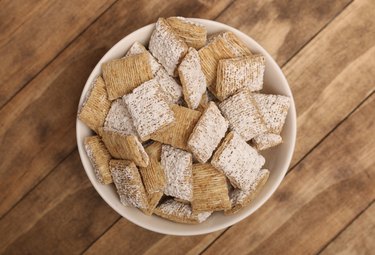
Breakfast is often referred to as the most important meal of the day. People enjoy eating a variety of foods, including pancakes, waffles, eggs and bacon when they have the time. However, on a day-to-day basis, cereals are one of the most popular breakfast options because of their nutritional benefits and ease of preparation. In America and many other countries, cereals like Frosted Mini-Wheats have additional vitamins and minerals. These added nutrients make Frosted Mini-Wheats a nutritious breakfast option to start your day.
Are Frosted Mini-Wheats Healthy?
Video of the Day
Frosted Mini-Wheats are a healthy breakfast cereal. All of Kellogg's breakfast products are fortified, making them extra nutritious. According to Kellogg's and the United States Department of Agriculture, Frosted Mini-Wheats contain the following vitamins per serving of 25 biscuits, or approximately 55 grams:
Video of the Day
- Thiamin (vitamin B-1). Each serving of Frosted Mini-Wheats has 0.540 milligrams of vitamin B-1.
- Riboflavin (vitamin B-2). Each serving of Frosted Mini-Wheats has 0.420 milligrams of vitamin B-2.
- Niacin (vitamin B-3). Each serving of Frosted Mini-Wheats has 5 milligrams of vitamin B-3.
- Vitamin B-6. Each serving of Frosted Mini-Wheats has half a milligram of vitamin B-6.
- Folic acid (vitamin B-9). Each serving of Frosted Mini-Wheats has 50 percent of your daily required intake of vitamin B-9.
- Vitamin B-12. Each serving of Frosted Mini-Wheats has 1.5 micrograms of vitamin B-12.
Frosted Mini-Wheats also contain the following minerals in each serving:
- Iron. Each serving of Frosted Mini-Wheats has 16.20 milligrams of iron.
- Magnesium. Each serving of Frosted Mini-Wheats has 40 milligrams of magnesium.
- Phosphorus. Each serving of Frosted Mini-Wheats has 150 milligrams of phosphorus.
- Potassium. Each serving of Frosted Mini-Wheats has 200 milligrams of potassium.
- Zinc. Each serving of Frosted Mini-Wheats has 1.5 milligrams of zinc.
In addition to these vitamins and minerals, Frosted Mini-Wheats are made from whole-grain wheat and are an excellent source of fiber.
Frosted Mini-Wheats come in various combinations, such as blueberry, maple brown sugar and Little Bites. Frosted Mini-Wheats nutrition facts can be found on Kellogg's website. Since cereals are often eaten with milk, this website lists the nutrition facts for Frosted Mini-Wheats with and without skim milk. Alternatively, if your Frosted Mini-Wheats come from a different manufacturer, or you use a different type of milk, you can find the nutritional information for them on the United States Department of Agriculture food database.
Read More: High-Fiber Cereal for Kids
What About the Sugar?
Frosted Mini-Wheats are healthy with all of those vitamins and minerals, but you should watch out for their sugar content. The "frosted" part means that each serving has 11 grams of sugar. This is equivalent to about 21 grams of sugar for every 100 grams of cereal. If you think this is a lot, you're right. The American Heart Association recommends not more than 25 grams of added sugar for women and 35 grams of added sugar for men each day. However, many breakfast cereals have similar sugar content. Cereals like Cinnamon Toast Crunch have 9 grams of sugar per serving, but in 100 grams this sugar content is equal to about 29 grams in total. Honey Nut Cheerios have 9 grams of sugar per serving, but its total sugar content in 100 grams is about 32 grams. On the whole, Frosted Mini-Wheats have a lower overall sugar content than many other types of breakfast cereals. However, the larger recommended serving size may mean that you're eating a few grams of extra sugar compared to some of the alternatives.
- Emory.edu: Chicago Journals: The History of Food Fortification in the United States: Its Relevance for Current Fortification Efforts in Developing Countries
- Kellogg's: Vitamin & Mineral Fortified
- General Mills: Cinnamon Toast Crunch Product List: Cinnamon Toast Crunch
- General Mills: Cheerios Product List: Honey Nut Cheerios
- American Heart Association: Added Sugars
- International Journal of Gastronomy and Food Science: Breakfast: The Most Important Meal of the Day?
- Kellogg's Smart Label: Frosted Mini-Wheats
- USDA Branded Food Products Database: Frosted Mini Wheats
- Kellogg's Frosted Mini-Wheats